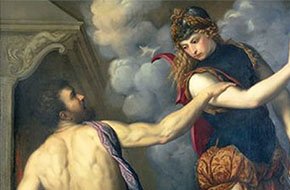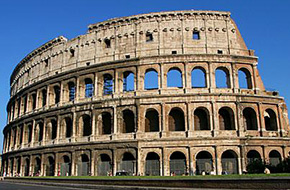R. Scott Smith
 R. Scott Smith, Professor of Classics at the University of New Hampshire, has been studying and writing about the myths of the Greeks and Romans for the past fifteen years. Following his earlier works on myth (Anthology of Classical Myth (2004); Apollodorus' Library and Hyginus' Fabulae (2007); Writing Myth: Mythography in the Ancient World (2013), Ancient Rome: An Anthology of Sources (2014), and The Oxford Handbook of Greek and Roman Mythography (2017). In addition to his love for all things mythical, he also specializes in the history of Rome, and enjoys taking students each January to the eternal city to see the ancient monuments and partake in the food and culture. In 2014 he published
R. Scott Smith, Professor of Classics at the University of New Hampshire, has been studying and writing about the myths of the Greeks and Romans for the past fifteen years. Following his earlier works on myth (Anthology of Classical Myth (2004); Apollodorus' Library and Hyginus' Fabulae (2007); Writing Myth: Mythography in the Ancient World (2013), Ancient Rome: An Anthology of Sources (2014), and The Oxford Handbook of Greek and Roman Mythography (2017). In addition to his love for all things mythical, he also specializes in the history of Rome, and enjoys taking students each January to the eternal city to see the ancient monuments and partake in the food and culture. In 2014 he published
Watch a video of his Rome and Pompeii talk at the Hooksett Library.
R. Scott Smith's Programs

How Did the Greeks Believe Their Myths?
Greek myth exerted a powerful influence on the Greeks and Romans, and as cultures and circumstances changed, different methods developed to incorporate mythology. Perhaps most notably, says presenter R. Scott Smith, Christians adopted and adapted Greek myths by allegorizing the stories, seeking to uncover the real and Christian truths underneath the facade of pagan gods and heroes. Some Greeks tried to rationalize the stories, imagining that they were simply ordinary events that were blown out of proportion. Others saw myth as pseudo-history, or sometimes pseudo-science. This program will investigate the major ways that the Greeks tried to explain and interpret their own mythical past over the course of a thousand years.

Rome and Pompeii: Discovering and Preserving the Past
Rome and Pompeii were part of the "Grand Tour" for upper-class elite from the 17th through the 19th centuries, and remain today the primary sites through which we reach back into the Roman empire's past. R. Scott Smith explores the archaeological remains of Rome, the "Eternal City," and Pompeii, the town that was buried by the eruption of Vesuvius in 79 AD, and discusses the problems of preserving these ancient ruins. The latter issue is especially important as the great monuments that symbolize the past have recently been threatened (the Colisseum by frigid temperatures in 2011-12) or completely destroyed (The House of the Gladiator by torrential rains in 2010)